Business Management Project Assessment: UGB009 Report
VerifiedAdded on 2023/01/18
|11
|2866
|36
Report
AI Summary
This report presents a comprehensive assessment of a business management project, employing both quantitative and qualitative research approaches. The report begins with an introduction to project management and its significance, followed by an exploration of quantitative research, including its aim, objectives, methodology, findings, and recommendations. The quantitative section focuses on identifying factors impacting strategic project management and business performance, utilizing statistical analysis and tools like SPSS. The report then transitions to qualitative research, investigating the importance of management and its interrelation with organizational success, with a focus on interpretivism and inductive approaches. The methodology includes exploratory research designs and primary data collection methods. The findings highlight the critical role of management in achieving organizational goals and strategic agility. The report concludes with a literature review examining studies on strategic project management, bridging organizational strategy and project management goals. It analyzes various management theories, strategic performance management systems (SPMS), and their impact on business performance, offering insights into financial and non-financial measures and their influence on managerial decisions and strategic alignment.

UGB009 Business management project
assessment.
assessment.
Paraphrase This Document
Need a fresh take? Get an instant paraphrase of this document with our AI Paraphraser
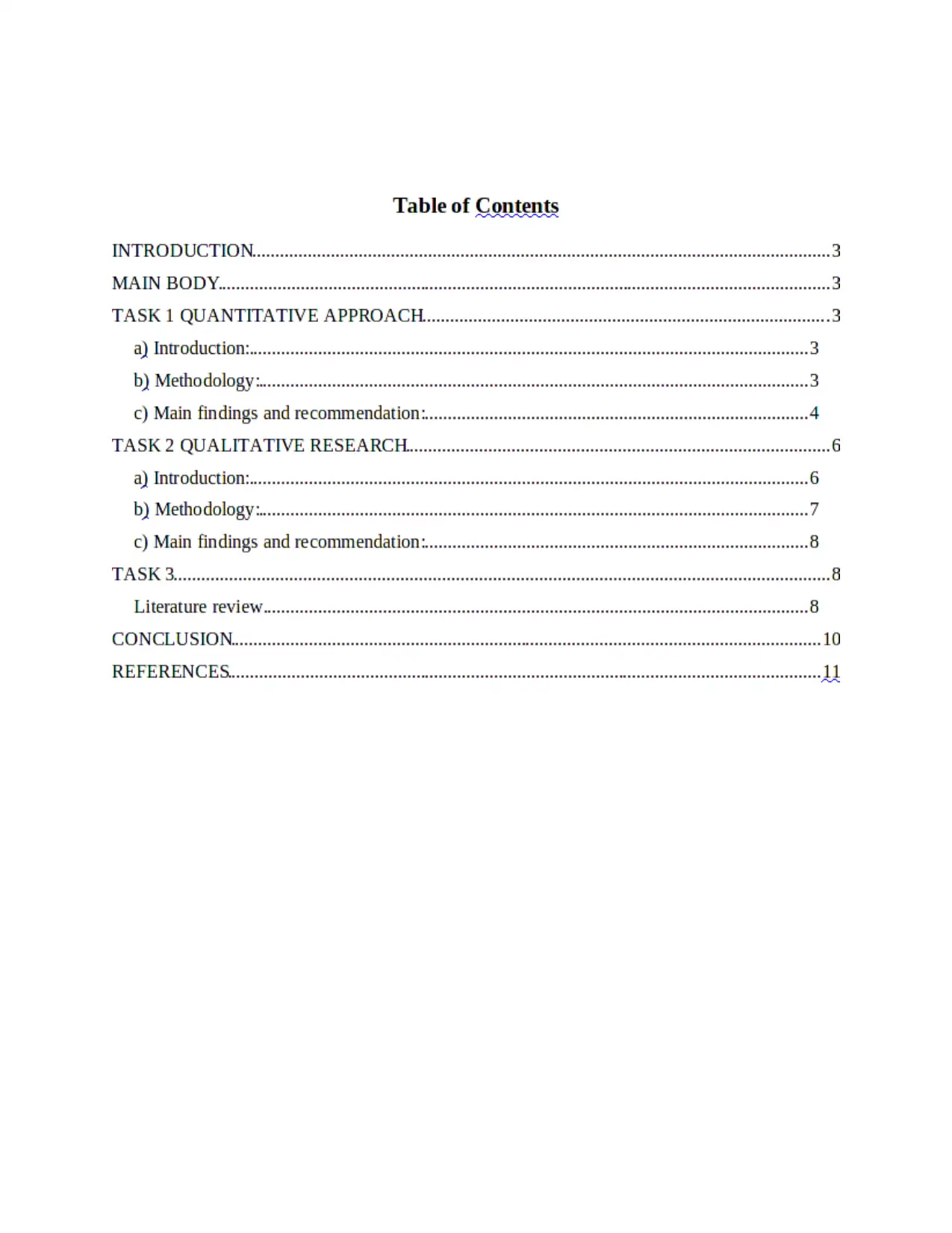
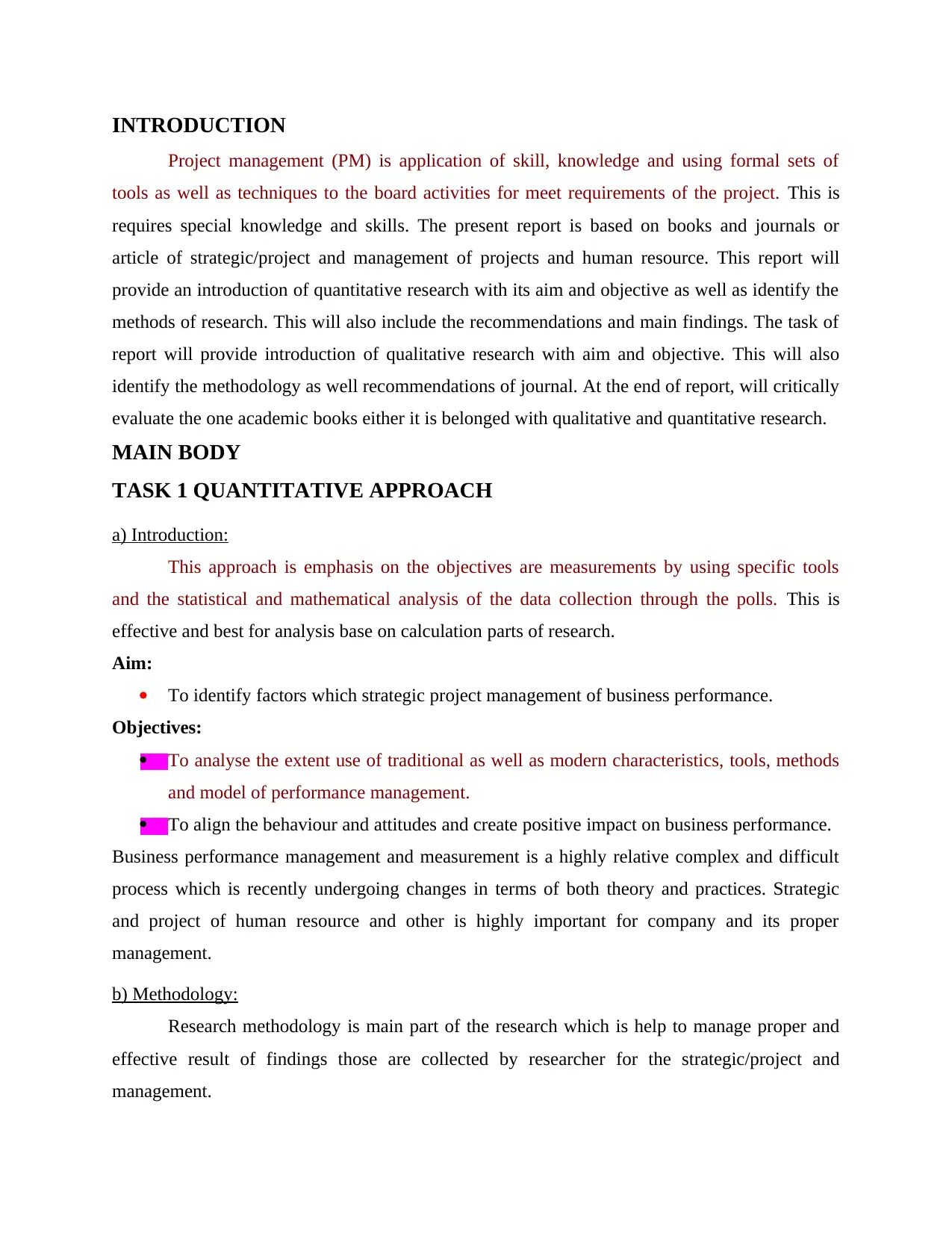
INTRODUCTION
Project management (PM) is application of skill, knowledge and using formal sets of
tools as well as techniques to the board activities for meet requirements of the project. This is
requires special knowledge and skills. The present report is based on books and journals or
article of strategic/project and management of projects and human resource. This report will
provide an introduction of quantitative research with its aim and objective as well as identify the
methods of research. This will also include the recommendations and main findings. The task of
report will provide introduction of qualitative research with aim and objective. This will also
identify the methodology as well recommendations of journal. At the end of report, will critically
evaluate the one academic books either it is belonged with qualitative and quantitative research.
MAIN BODY
TASK 1 QUANTITATIVE APPROACH
a) Introduction:
This approach is emphasis on the objectives are measurements by using specific tools
and the statistical and mathematical analysis of the data collection through the polls. This is
effective and best for analysis base on calculation parts of research.
Aim:
To identify factors which strategic project management of business performance.
Objectives:
To analyse the extent use of traditional as well as modern characteristics, tools, methods
and model of performance management.
To align the behaviour and attitudes and create positive impact on business performance.
Business performance management and measurement is a highly relative complex and difficult
process which is recently undergoing changes in terms of both theory and practices. Strategic
and project of human resource and other is highly important for company and its proper
management.
b) Methodology:
Research methodology is main part of the research which is help to manage proper and
effective result of findings those are collected by researcher for the strategic/project and
management.
Project management (PM) is application of skill, knowledge and using formal sets of
tools as well as techniques to the board activities for meet requirements of the project. This is
requires special knowledge and skills. The present report is based on books and journals or
article of strategic/project and management of projects and human resource. This report will
provide an introduction of quantitative research with its aim and objective as well as identify the
methods of research. This will also include the recommendations and main findings. The task of
report will provide introduction of qualitative research with aim and objective. This will also
identify the methodology as well recommendations of journal. At the end of report, will critically
evaluate the one academic books either it is belonged with qualitative and quantitative research.
MAIN BODY
TASK 1 QUANTITATIVE APPROACH
a) Introduction:
This approach is emphasis on the objectives are measurements by using specific tools
and the statistical and mathematical analysis of the data collection through the polls. This is
effective and best for analysis base on calculation parts of research.
Aim:
To identify factors which strategic project management of business performance.
Objectives:
To analyse the extent use of traditional as well as modern characteristics, tools, methods
and model of performance management.
To align the behaviour and attitudes and create positive impact on business performance.
Business performance management and measurement is a highly relative complex and difficult
process which is recently undergoing changes in terms of both theory and practices. Strategic
and project of human resource and other is highly important for company and its proper
management.
b) Methodology:
Research methodology is main part of the research which is help to manage proper and
effective result of findings those are collected by researcher for the strategic/project and
management.
⊘ This is a preview!⊘
Do you want full access?
Subscribe today to unlock all pages.

Trusted by 1+ million students worldwide
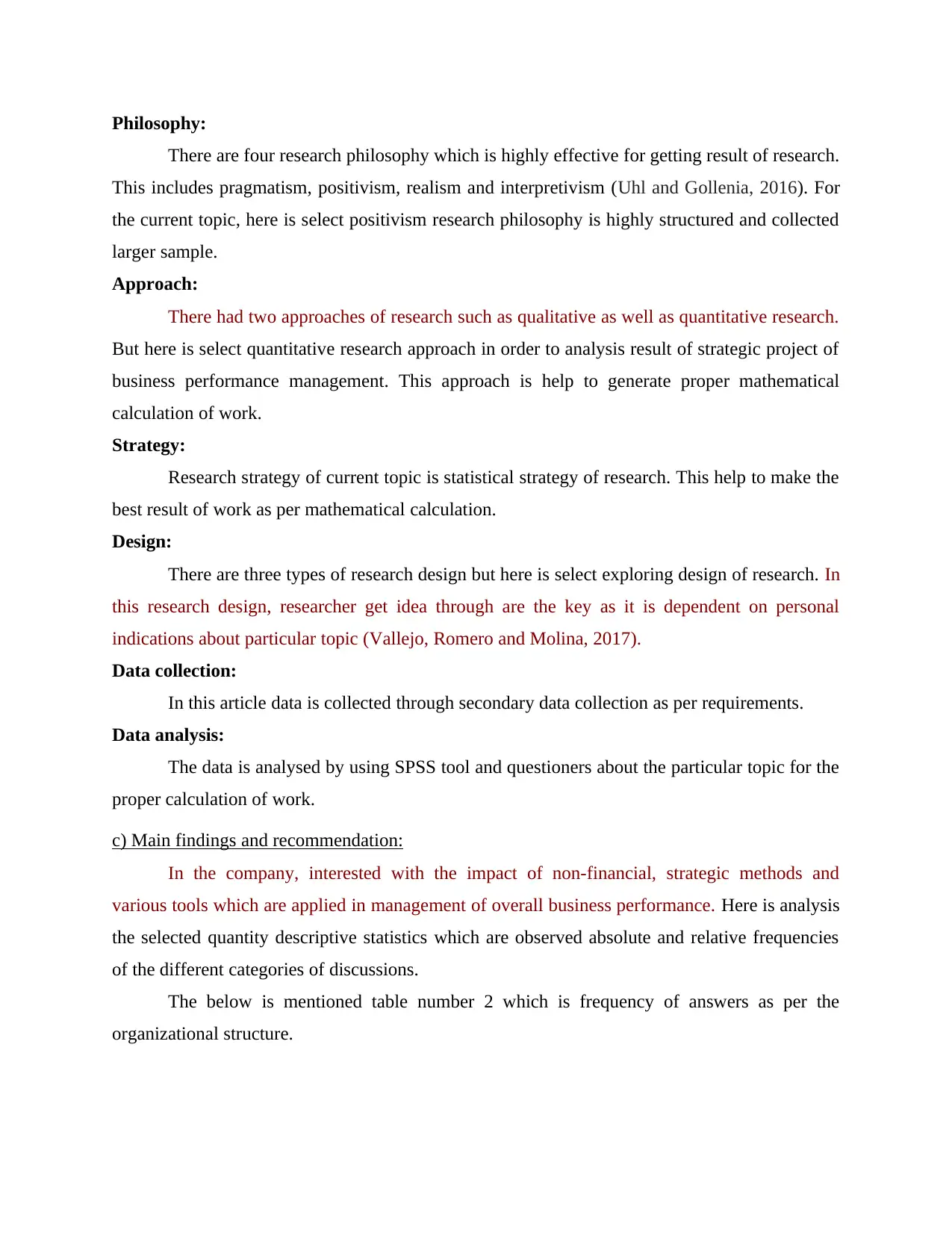
Philosophy:
There are four research philosophy which is highly effective for getting result of research.
This includes pragmatism, positivism, realism and interpretivism (Uhl and Gollenia, 2016). For
the current topic, here is select positivism research philosophy is highly structured and collected
larger sample.
Approach:
There had two approaches of research such as qualitative as well as quantitative research.
But here is select quantitative research approach in order to analysis result of strategic project of
business performance management. This approach is help to generate proper mathematical
calculation of work.
Strategy:
Research strategy of current topic is statistical strategy of research. This help to make the
best result of work as per mathematical calculation.
Design:
There are three types of research design but here is select exploring design of research. In
this research design, researcher get idea through are the key as it is dependent on personal
indications about particular topic (Vallejo, Romero and Molina, 2017).
Data collection:
In this article data is collected through secondary data collection as per requirements.
Data analysis:
The data is analysed by using SPSS tool and questioners about the particular topic for the
proper calculation of work.
c) Main findings and recommendation:
In the company, interested with the impact of non-financial, strategic methods and
various tools which are applied in management of overall business performance. Here is analysis
the selected quantity descriptive statistics which are observed absolute and relative frequencies
of the different categories of discussions.
The below is mentioned table number 2 which is frequency of answers as per the
organizational structure.
There are four research philosophy which is highly effective for getting result of research.
This includes pragmatism, positivism, realism and interpretivism (Uhl and Gollenia, 2016). For
the current topic, here is select positivism research philosophy is highly structured and collected
larger sample.
Approach:
There had two approaches of research such as qualitative as well as quantitative research.
But here is select quantitative research approach in order to analysis result of strategic project of
business performance management. This approach is help to generate proper mathematical
calculation of work.
Strategy:
Research strategy of current topic is statistical strategy of research. This help to make the
best result of work as per mathematical calculation.
Design:
There are three types of research design but here is select exploring design of research. In
this research design, researcher get idea through are the key as it is dependent on personal
indications about particular topic (Vallejo, Romero and Molina, 2017).
Data collection:
In this article data is collected through secondary data collection as per requirements.
Data analysis:
The data is analysed by using SPSS tool and questioners about the particular topic for the
proper calculation of work.
c) Main findings and recommendation:
In the company, interested with the impact of non-financial, strategic methods and
various tools which are applied in management of overall business performance. Here is analysis
the selected quantity descriptive statistics which are observed absolute and relative frequencies
of the different categories of discussions.
The below is mentioned table number 2 which is frequency of answers as per the
organizational structure.
Paraphrase This Document
Need a fresh take? Get an instant paraphrase of this document with our AI Paraphraser
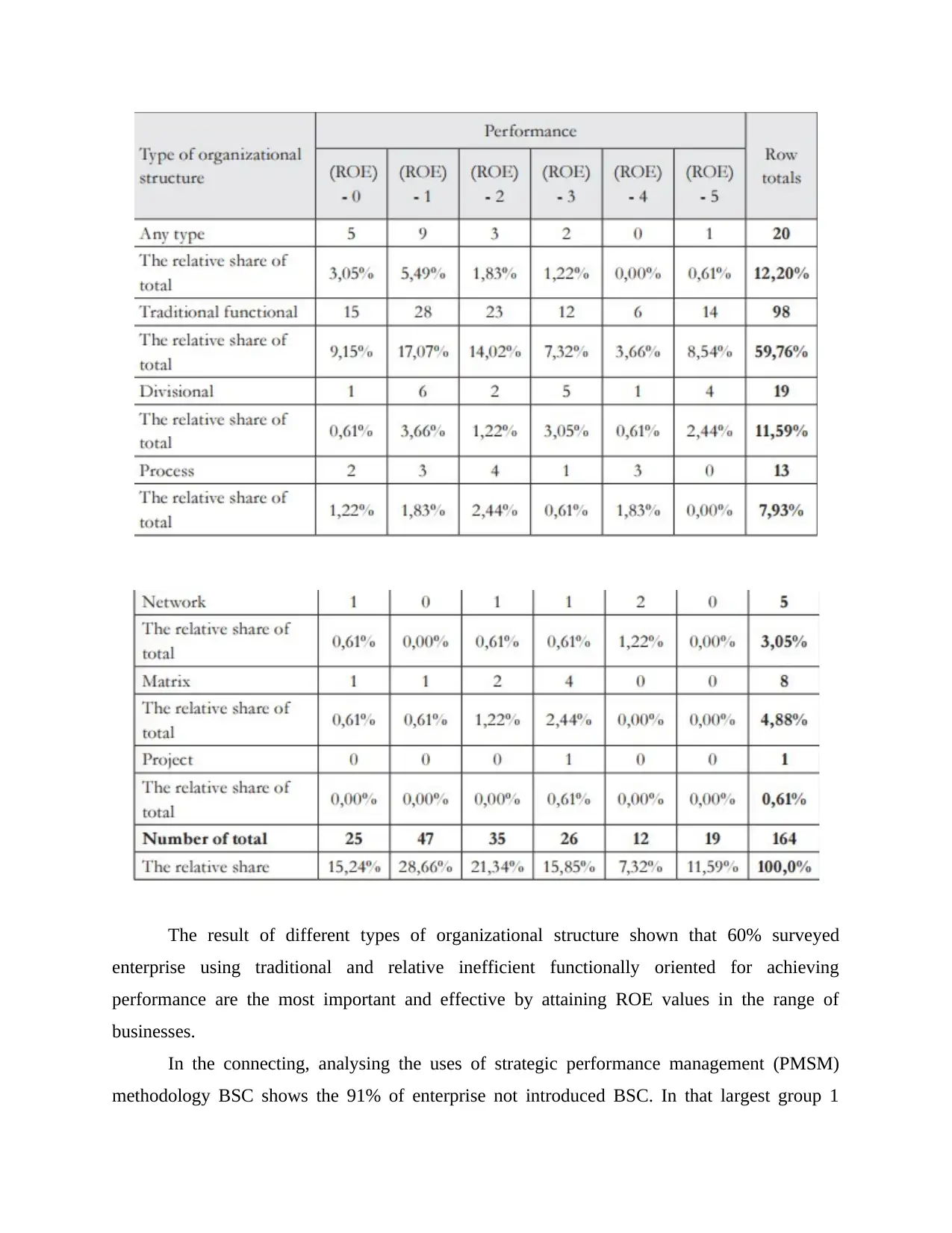
The result of different types of organizational structure shown that 60% surveyed
enterprise using traditional and relative inefficient functionally oriented for achieving
performance are the most important and effective by attaining ROE values in the range of
businesses.
In the connecting, analysing the uses of strategic performance management (PMSM)
methodology BSC shows the 91% of enterprise not introduced BSC. In that largest group 1
enterprise using traditional and relative inefficient functionally oriented for achieving
performance are the most important and effective by attaining ROE values in the range of
businesses.
In the connecting, analysing the uses of strategic performance management (PMSM)
methodology BSC shows the 91% of enterprise not introduced BSC. In that largest group 1
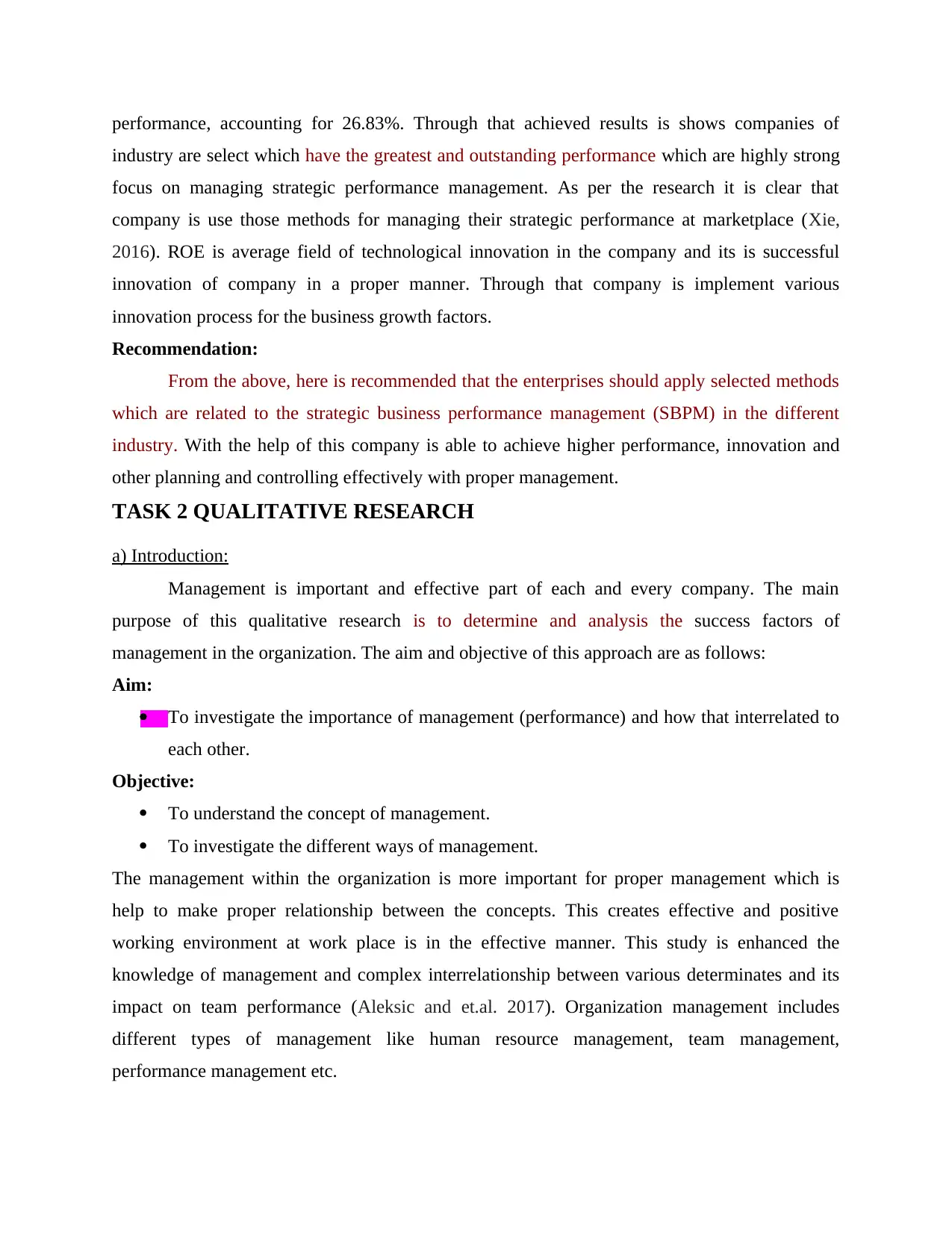
performance, accounting for 26.83%. Through that achieved results is shows companies of
industry are select which have the greatest and outstanding performance which are highly strong
focus on managing strategic performance management. As per the research it is clear that
company is use those methods for managing their strategic performance at marketplace (Xie,
2016). ROE is average field of technological innovation in the company and its is successful
innovation of company in a proper manner. Through that company is implement various
innovation process for the business growth factors.
Recommendation:
From the above, here is recommended that the enterprises should apply selected methods
which are related to the strategic business performance management (SBPM) in the different
industry. With the help of this company is able to achieve higher performance, innovation and
other planning and controlling effectively with proper management.
TASK 2 QUALITATIVE RESEARCH
a) Introduction:
Management is important and effective part of each and every company. The main
purpose of this qualitative research is to determine and analysis the success factors of
management in the organization. The aim and objective of this approach are as follows:
Aim:
To investigate the importance of management (performance) and how that interrelated to
each other.
Objective:
To understand the concept of management.
To investigate the different ways of management.
The management within the organization is more important for proper management which is
help to make proper relationship between the concepts. This creates effective and positive
working environment at work place is in the effective manner. This study is enhanced the
knowledge of management and complex interrelationship between various determinates and its
impact on team performance (Aleksic and et.al. 2017). Organization management includes
different types of management like human resource management, team management,
performance management etc.
industry are select which have the greatest and outstanding performance which are highly strong
focus on managing strategic performance management. As per the research it is clear that
company is use those methods for managing their strategic performance at marketplace (Xie,
2016). ROE is average field of technological innovation in the company and its is successful
innovation of company in a proper manner. Through that company is implement various
innovation process for the business growth factors.
Recommendation:
From the above, here is recommended that the enterprises should apply selected methods
which are related to the strategic business performance management (SBPM) in the different
industry. With the help of this company is able to achieve higher performance, innovation and
other planning and controlling effectively with proper management.
TASK 2 QUALITATIVE RESEARCH
a) Introduction:
Management is important and effective part of each and every company. The main
purpose of this qualitative research is to determine and analysis the success factors of
management in the organization. The aim and objective of this approach are as follows:
Aim:
To investigate the importance of management (performance) and how that interrelated to
each other.
Objective:
To understand the concept of management.
To investigate the different ways of management.
The management within the organization is more important for proper management which is
help to make proper relationship between the concepts. This creates effective and positive
working environment at work place is in the effective manner. This study is enhanced the
knowledge of management and complex interrelationship between various determinates and its
impact on team performance (Aleksic and et.al. 2017). Organization management includes
different types of management like human resource management, team management,
performance management etc.
⊘ This is a preview!⊘
Do you want full access?
Subscribe today to unlock all pages.

Trusted by 1+ million students worldwide
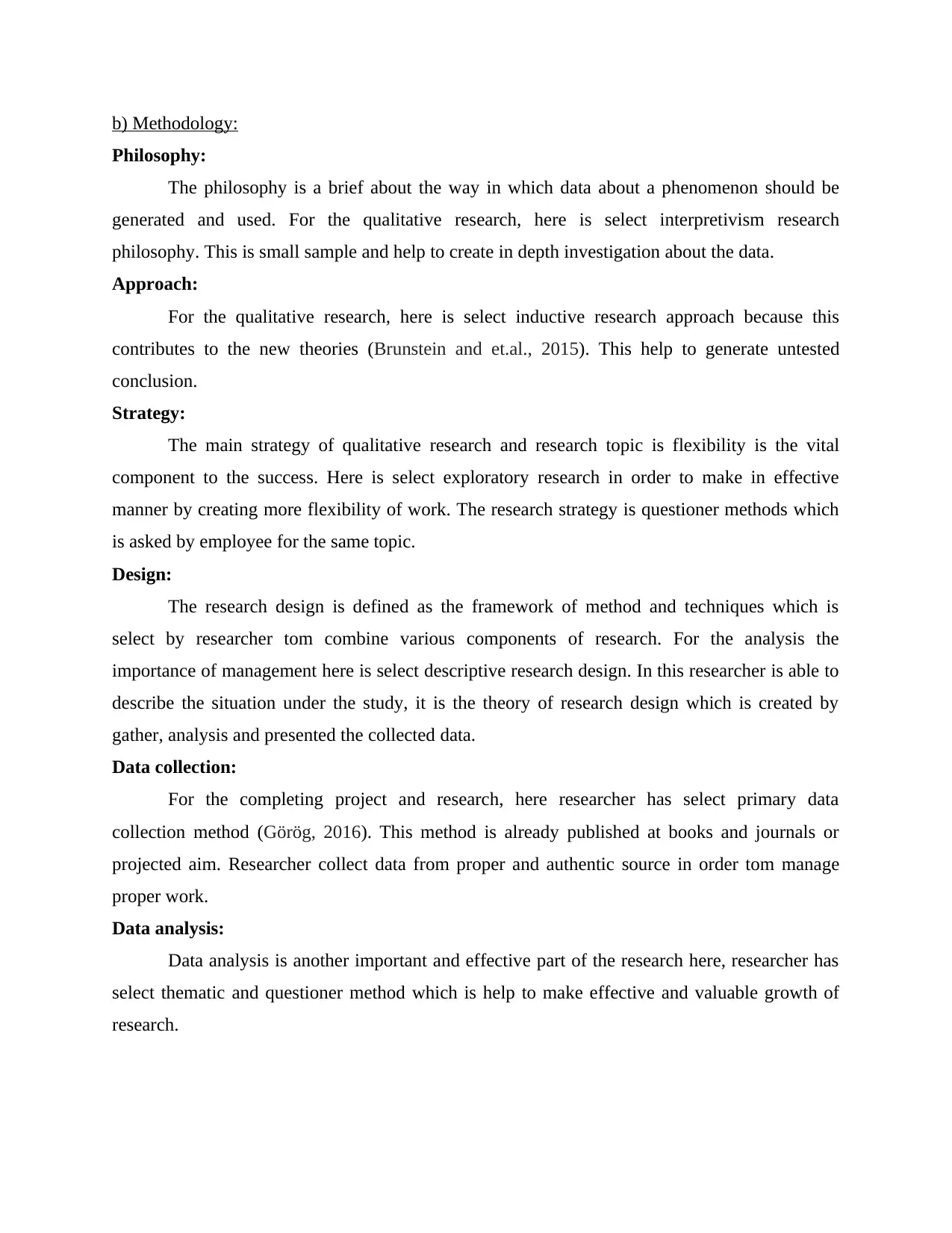
b) Methodology:
Philosophy:
The philosophy is a brief about the way in which data about a phenomenon should be
generated and used. For the qualitative research, here is select interpretivism research
philosophy. This is small sample and help to create in depth investigation about the data.
Approach:
For the qualitative research, here is select inductive research approach because this
contributes to the new theories (Brunstein and et.al., 2015). This help to generate untested
conclusion.
Strategy:
The main strategy of qualitative research and research topic is flexibility is the vital
component to the success. Here is select exploratory research in order to make in effective
manner by creating more flexibility of work. The research strategy is questioner methods which
is asked by employee for the same topic.
Design:
The research design is defined as the framework of method and techniques which is
select by researcher tom combine various components of research. For the analysis the
importance of management here is select descriptive research design. In this researcher is able to
describe the situation under the study, it is the theory of research design which is created by
gather, analysis and presented the collected data.
Data collection:
For the completing project and research, here researcher has select primary data
collection method (Görög, 2016). This method is already published at books and journals or
projected aim. Researcher collect data from proper and authentic source in order tom manage
proper work.
Data analysis:
Data analysis is another important and effective part of the research here, researcher has
select thematic and questioner method which is help to make effective and valuable growth of
research.
Philosophy:
The philosophy is a brief about the way in which data about a phenomenon should be
generated and used. For the qualitative research, here is select interpretivism research
philosophy. This is small sample and help to create in depth investigation about the data.
Approach:
For the qualitative research, here is select inductive research approach because this
contributes to the new theories (Brunstein and et.al., 2015). This help to generate untested
conclusion.
Strategy:
The main strategy of qualitative research and research topic is flexibility is the vital
component to the success. Here is select exploratory research in order to make in effective
manner by creating more flexibility of work. The research strategy is questioner methods which
is asked by employee for the same topic.
Design:
The research design is defined as the framework of method and techniques which is
select by researcher tom combine various components of research. For the analysis the
importance of management here is select descriptive research design. In this researcher is able to
describe the situation under the study, it is the theory of research design which is created by
gather, analysis and presented the collected data.
Data collection:
For the completing project and research, here researcher has select primary data
collection method (Görög, 2016). This method is already published at books and journals or
projected aim. Researcher collect data from proper and authentic source in order tom manage
proper work.
Data analysis:
Data analysis is another important and effective part of the research here, researcher has
select thematic and questioner method which is help to make effective and valuable growth of
research.
Paraphrase This Document
Need a fresh take? Get an instant paraphrase of this document with our AI Paraphraser
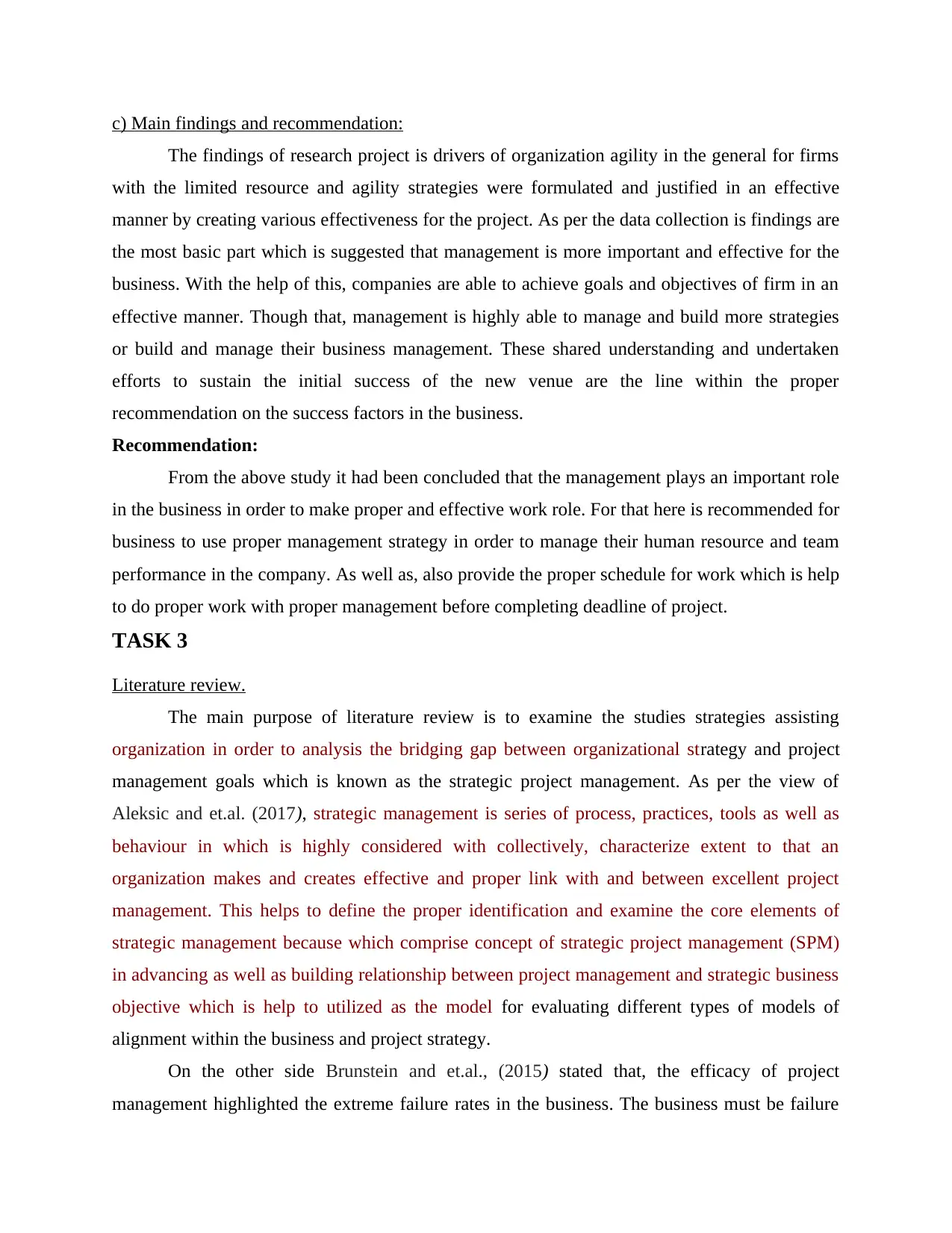
c) Main findings and recommendation:
The findings of research project is drivers of organization agility in the general for firms
with the limited resource and agility strategies were formulated and justified in an effective
manner by creating various effectiveness for the project. As per the data collection is findings are
the most basic part which is suggested that management is more important and effective for the
business. With the help of this, companies are able to achieve goals and objectives of firm in an
effective manner. Though that, management is highly able to manage and build more strategies
or build and manage their business management. These shared understanding and undertaken
efforts to sustain the initial success of the new venue are the line within the proper
recommendation on the success factors in the business.
Recommendation:
From the above study it had been concluded that the management plays an important role
in the business in order to make proper and effective work role. For that here is recommended for
business to use proper management strategy in order to manage their human resource and team
performance in the company. As well as, also provide the proper schedule for work which is help
to do proper work with proper management before completing deadline of project.
TASK 3
Literature review.
The main purpose of literature review is to examine the studies strategies assisting
organization in order to analysis the bridging gap between organizational strategy and project
management goals which is known as the strategic project management. As per the view of
Aleksic and et.al. (2017), strategic management is series of process, practices, tools as well as
behaviour in which is highly considered with collectively, characterize extent to that an
organization makes and creates effective and proper link with and between excellent project
management. This helps to define the proper identification and examine the core elements of
strategic management because which comprise concept of strategic project management (SPM)
in advancing as well as building relationship between project management and strategic business
objective which is help to utilized as the model for evaluating different types of models of
alignment within the business and project strategy.
On the other side Brunstein and et.al., (2015) stated that, the efficacy of project
management highlighted the extreme failure rates in the business. The business must be failure
The findings of research project is drivers of organization agility in the general for firms
with the limited resource and agility strategies were formulated and justified in an effective
manner by creating various effectiveness for the project. As per the data collection is findings are
the most basic part which is suggested that management is more important and effective for the
business. With the help of this, companies are able to achieve goals and objectives of firm in an
effective manner. Though that, management is highly able to manage and build more strategies
or build and manage their business management. These shared understanding and undertaken
efforts to sustain the initial success of the new venue are the line within the proper
recommendation on the success factors in the business.
Recommendation:
From the above study it had been concluded that the management plays an important role
in the business in order to make proper and effective work role. For that here is recommended for
business to use proper management strategy in order to manage their human resource and team
performance in the company. As well as, also provide the proper schedule for work which is help
to do proper work with proper management before completing deadline of project.
TASK 3
Literature review.
The main purpose of literature review is to examine the studies strategies assisting
organization in order to analysis the bridging gap between organizational strategy and project
management goals which is known as the strategic project management. As per the view of
Aleksic and et.al. (2017), strategic management is series of process, practices, tools as well as
behaviour in which is highly considered with collectively, characterize extent to that an
organization makes and creates effective and proper link with and between excellent project
management. This helps to define the proper identification and examine the core elements of
strategic management because which comprise concept of strategic project management (SPM)
in advancing as well as building relationship between project management and strategic business
objective which is help to utilized as the model for evaluating different types of models of
alignment within the business and project strategy.
On the other side Brunstein and et.al., (2015) stated that, the efficacy of project
management highlighted the extreme failure rates in the business. The business must be failure
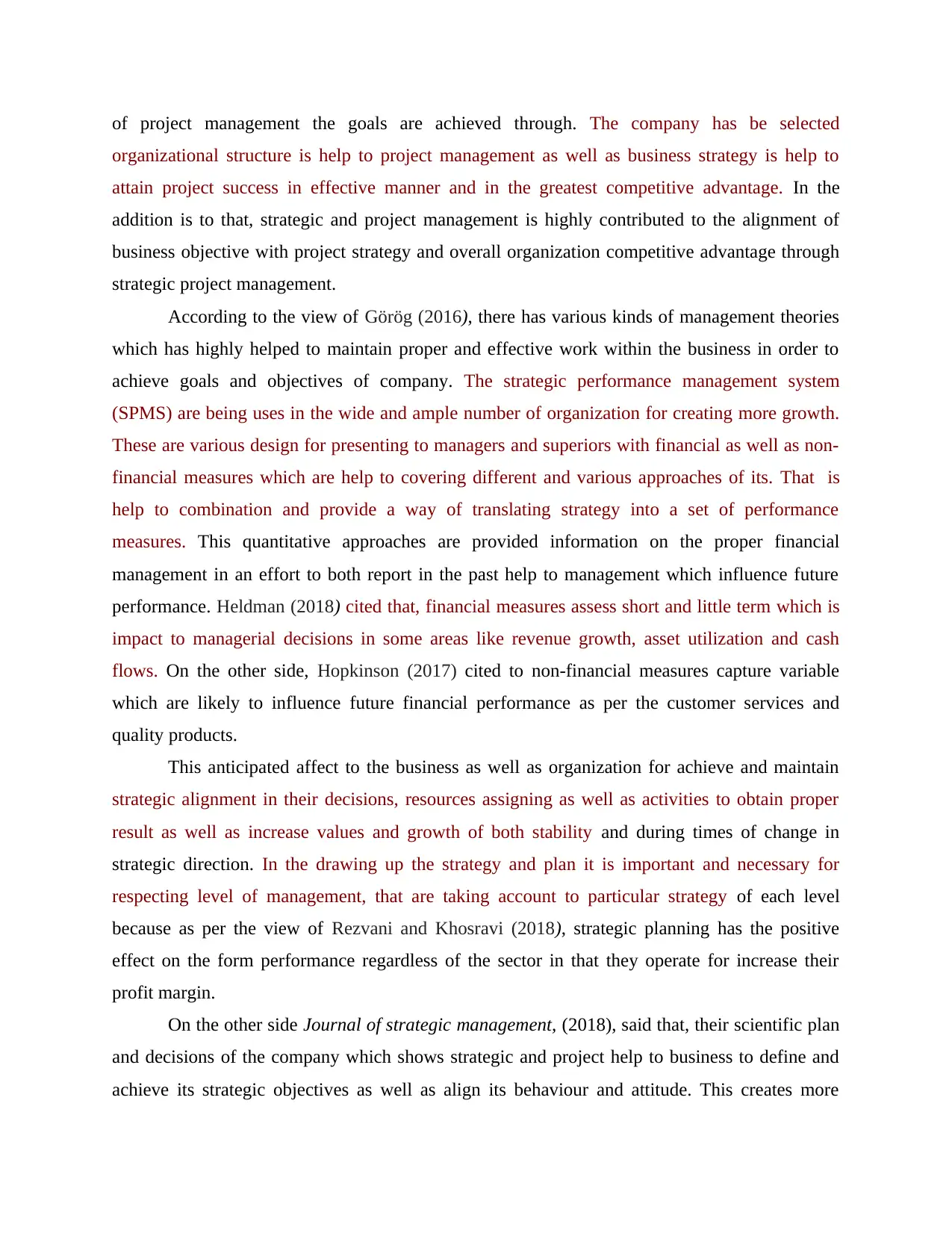
of project management the goals are achieved through. The company has be selected
organizational structure is help to project management as well as business strategy is help to
attain project success in effective manner and in the greatest competitive advantage. In the
addition is to that, strategic and project management is highly contributed to the alignment of
business objective with project strategy and overall organization competitive advantage through
strategic project management.
According to the view of Görög (2016), there has various kinds of management theories
which has highly helped to maintain proper and effective work within the business in order to
achieve goals and objectives of company. The strategic performance management system
(SPMS) are being uses in the wide and ample number of organization for creating more growth.
These are various design for presenting to managers and superiors with financial as well as non-
financial measures which are help to covering different and various approaches of its. That is
help to combination and provide a way of translating strategy into a set of performance
measures. This quantitative approaches are provided information on the proper financial
management in an effort to both report in the past help to management which influence future
performance. Heldman (2018) cited that, financial measures assess short and little term which is
impact to managerial decisions in some areas like revenue growth, asset utilization and cash
flows. On the other side, Hopkinson (2017) cited to non-financial measures capture variable
which are likely to influence future financial performance as per the customer services and
quality products.
This anticipated affect to the business as well as organization for achieve and maintain
strategic alignment in their decisions, resources assigning as well as activities to obtain proper
result as well as increase values and growth of both stability and during times of change in
strategic direction. In the drawing up the strategy and plan it is important and necessary for
respecting level of management, that are taking account to particular strategy of each level
because as per the view of Rezvani and Khosravi (2018), strategic planning has the positive
effect on the form performance regardless of the sector in that they operate for increase their
profit margin.
On the other side Journal of strategic management, (2018), said that, their scientific plan
and decisions of the company which shows strategic and project help to business to define and
achieve its strategic objectives as well as align its behaviour and attitude. This creates more
organizational structure is help to project management as well as business strategy is help to
attain project success in effective manner and in the greatest competitive advantage. In the
addition is to that, strategic and project management is highly contributed to the alignment of
business objective with project strategy and overall organization competitive advantage through
strategic project management.
According to the view of Görög (2016), there has various kinds of management theories
which has highly helped to maintain proper and effective work within the business in order to
achieve goals and objectives of company. The strategic performance management system
(SPMS) are being uses in the wide and ample number of organization for creating more growth.
These are various design for presenting to managers and superiors with financial as well as non-
financial measures which are help to covering different and various approaches of its. That is
help to combination and provide a way of translating strategy into a set of performance
measures. This quantitative approaches are provided information on the proper financial
management in an effort to both report in the past help to management which influence future
performance. Heldman (2018) cited that, financial measures assess short and little term which is
impact to managerial decisions in some areas like revenue growth, asset utilization and cash
flows. On the other side, Hopkinson (2017) cited to non-financial measures capture variable
which are likely to influence future financial performance as per the customer services and
quality products.
This anticipated affect to the business as well as organization for achieve and maintain
strategic alignment in their decisions, resources assigning as well as activities to obtain proper
result as well as increase values and growth of both stability and during times of change in
strategic direction. In the drawing up the strategy and plan it is important and necessary for
respecting level of management, that are taking account to particular strategy of each level
because as per the view of Rezvani and Khosravi (2018), strategic planning has the positive
effect on the form performance regardless of the sector in that they operate for increase their
profit margin.
On the other side Journal of strategic management, (2018), said that, their scientific plan
and decisions of the company which shows strategic and project help to business to define and
achieve its strategic objectives as well as align its behaviour and attitude. This creates more
⊘ This is a preview!⊘
Do you want full access?
Subscribe today to unlock all pages.

Trusted by 1+ million students worldwide
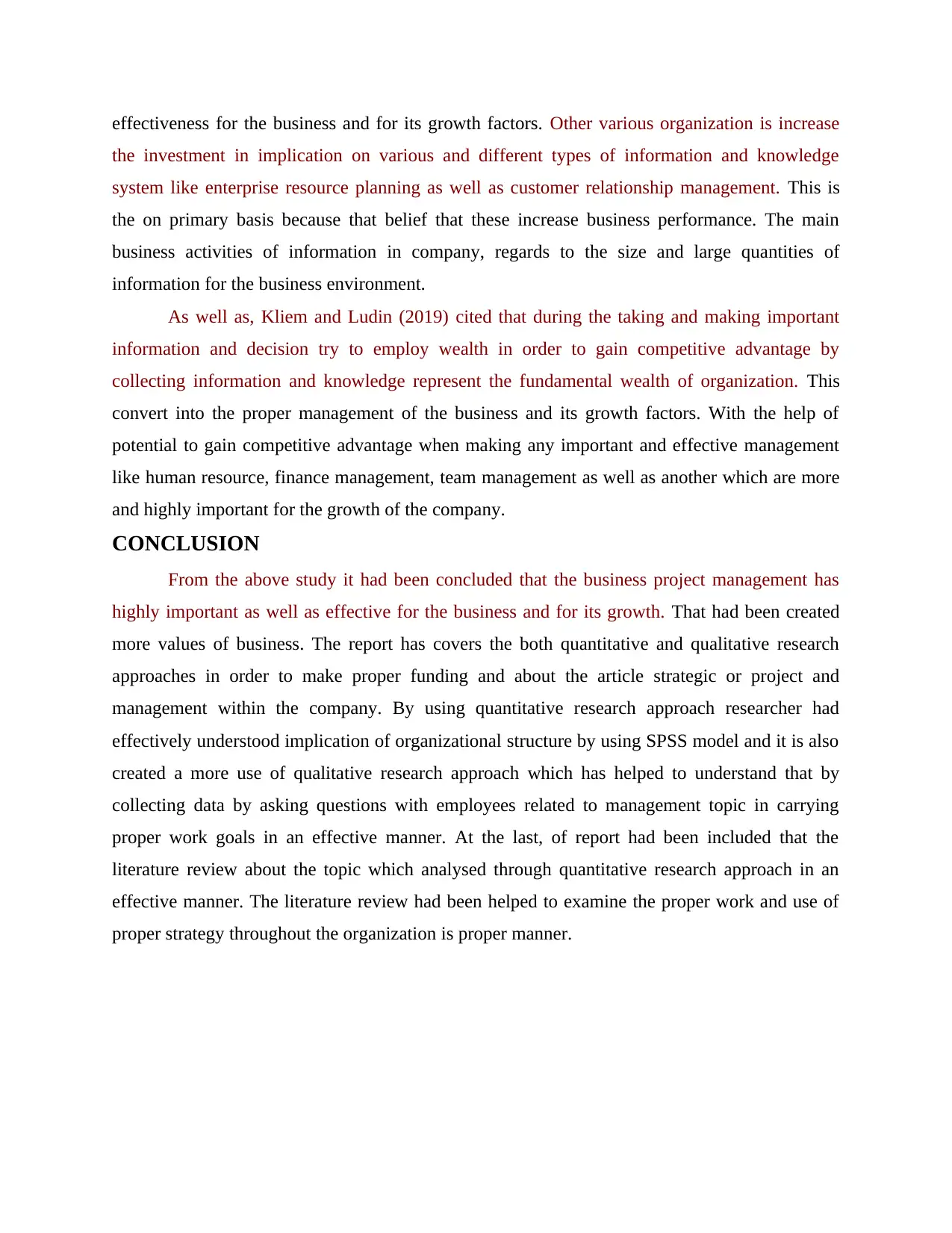
effectiveness for the business and for its growth factors. Other various organization is increase
the investment in implication on various and different types of information and knowledge
system like enterprise resource planning as well as customer relationship management. This is
the on primary basis because that belief that these increase business performance. The main
business activities of information in company, regards to the size and large quantities of
information for the business environment.
As well as, Kliem and Ludin (2019) cited that during the taking and making important
information and decision try to employ wealth in order to gain competitive advantage by
collecting information and knowledge represent the fundamental wealth of organization. This
convert into the proper management of the business and its growth factors. With the help of
potential to gain competitive advantage when making any important and effective management
like human resource, finance management, team management as well as another which are more
and highly important for the growth of the company.
CONCLUSION
From the above study it had been concluded that the business project management has
highly important as well as effective for the business and for its growth. That had been created
more values of business. The report has covers the both quantitative and qualitative research
approaches in order to make proper funding and about the article strategic or project and
management within the company. By using quantitative research approach researcher had
effectively understood implication of organizational structure by using SPSS model and it is also
created a more use of qualitative research approach which has helped to understand that by
collecting data by asking questions with employees related to management topic in carrying
proper work goals in an effective manner. At the last, of report had been included that the
literature review about the topic which analysed through quantitative research approach in an
effective manner. The literature review had been helped to examine the proper work and use of
proper strategy throughout the organization is proper manner.
the investment in implication on various and different types of information and knowledge
system like enterprise resource planning as well as customer relationship management. This is
the on primary basis because that belief that these increase business performance. The main
business activities of information in company, regards to the size and large quantities of
information for the business environment.
As well as, Kliem and Ludin (2019) cited that during the taking and making important
information and decision try to employ wealth in order to gain competitive advantage by
collecting information and knowledge represent the fundamental wealth of organization. This
convert into the proper management of the business and its growth factors. With the help of
potential to gain competitive advantage when making any important and effective management
like human resource, finance management, team management as well as another which are more
and highly important for the growth of the company.
CONCLUSION
From the above study it had been concluded that the business project management has
highly important as well as effective for the business and for its growth. That had been created
more values of business. The report has covers the both quantitative and qualitative research
approaches in order to make proper funding and about the article strategic or project and
management within the company. By using quantitative research approach researcher had
effectively understood implication of organizational structure by using SPSS model and it is also
created a more use of qualitative research approach which has helped to understand that by
collecting data by asking questions with employees related to management topic in carrying
proper work goals in an effective manner. At the last, of report had been included that the
literature review about the topic which analysed through quantitative research approach in an
effective manner. The literature review had been helped to examine the proper work and use of
proper strategy throughout the organization is proper manner.
Paraphrase This Document
Need a fresh take? Get an instant paraphrase of this document with our AI Paraphraser
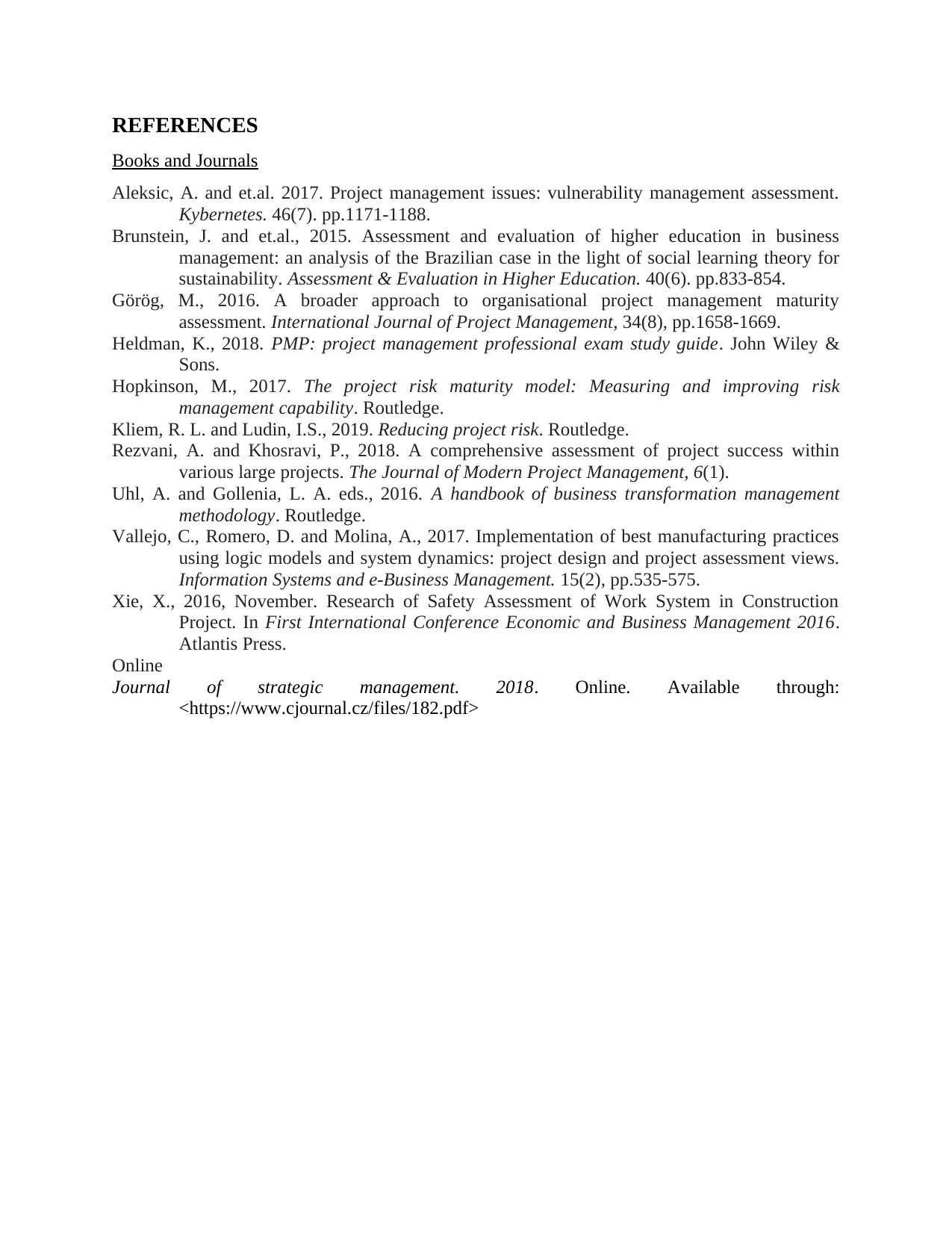
REFERENCES
Books and Journals
Aleksic, A. and et.al. 2017. Project management issues: vulnerability management assessment.
Kybernetes. 46(7). pp.1171-1188.
Brunstein, J. and et.al., 2015. Assessment and evaluation of higher education in business
management: an analysis of the Brazilian case in the light of social learning theory for
sustainability. Assessment & Evaluation in Higher Education. 40(6). pp.833-854.
Görög, M., 2016. A broader approach to organisational project management maturity
assessment. International Journal of Project Management, 34(8), pp.1658-1669.
Heldman, K., 2018. PMP: project management professional exam study guide. John Wiley &
Sons.
Hopkinson, M., 2017. The project risk maturity model: Measuring and improving risk
management capability. Routledge.
Kliem, R. L. and Ludin, I.S., 2019. Reducing project risk. Routledge.
Rezvani, A. and Khosravi, P., 2018. A comprehensive assessment of project success within
various large projects. The Journal of Modern Project Management, 6(1).
Uhl, A. and Gollenia, L. A. eds., 2016. A handbook of business transformation management
methodology. Routledge.
Vallejo, C., Romero, D. and Molina, A., 2017. Implementation of best manufacturing practices
using logic models and system dynamics: project design and project assessment views.
Information Systems and e-Business Management. 15(2), pp.535-575.
Xie, X., 2016, November. Research of Safety Assessment of Work System in Construction
Project. In First International Conference Economic and Business Management 2016.
Atlantis Press.
Online
Journal of strategic management. 2018. Online. Available through:
<https://www.cjournal.cz/files/182.pdf>
Books and Journals
Aleksic, A. and et.al. 2017. Project management issues: vulnerability management assessment.
Kybernetes. 46(7). pp.1171-1188.
Brunstein, J. and et.al., 2015. Assessment and evaluation of higher education in business
management: an analysis of the Brazilian case in the light of social learning theory for
sustainability. Assessment & Evaluation in Higher Education. 40(6). pp.833-854.
Görög, M., 2016. A broader approach to organisational project management maturity
assessment. International Journal of Project Management, 34(8), pp.1658-1669.
Heldman, K., 2018. PMP: project management professional exam study guide. John Wiley &
Sons.
Hopkinson, M., 2017. The project risk maturity model: Measuring and improving risk
management capability. Routledge.
Kliem, R. L. and Ludin, I.S., 2019. Reducing project risk. Routledge.
Rezvani, A. and Khosravi, P., 2018. A comprehensive assessment of project success within
various large projects. The Journal of Modern Project Management, 6(1).
Uhl, A. and Gollenia, L. A. eds., 2016. A handbook of business transformation management
methodology. Routledge.
Vallejo, C., Romero, D. and Molina, A., 2017. Implementation of best manufacturing practices
using logic models and system dynamics: project design and project assessment views.
Information Systems and e-Business Management. 15(2), pp.535-575.
Xie, X., 2016, November. Research of Safety Assessment of Work System in Construction
Project. In First International Conference Economic and Business Management 2016.
Atlantis Press.
Online
Journal of strategic management. 2018. Online. Available through:
<https://www.cjournal.cz/files/182.pdf>
1 out of 11
Related Documents
Your All-in-One AI-Powered Toolkit for Academic Success.
+13062052269
info@desklib.com
Available 24*7 on WhatsApp / Email
![[object Object]](/_next/static/media/star-bottom.7253800d.svg)
Unlock your academic potential
Copyright © 2020–2025 A2Z Services. All Rights Reserved. Developed and managed by ZUCOL.





